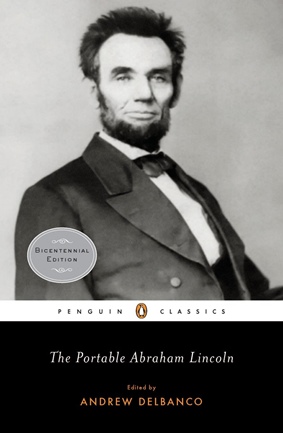Description
Celebrate the bicentennial of Abraham Lincoln's birth with this new edition of his greatest speeches and writings
Abraham Lincoln endowed the American language with a vigor and moral energy that has all but disappeared from today's public rhetoric. Lincoln's writings are testaments of our history, windows into his enigmatic personality, and resonant examples of the writer's art. The Portable Abraham Lincoln contains the great public speeches - the first debate with Stephen Douglas, the "House Divided" speech, the Gettysburg Address, the Second Inaugural Address - along with less familiar letters and memoranda that chart Lincoln's political career, his evolving stand against slavery, and his day-to-day conduct of the Civil War. This edition includes a revised introduction, updated notes on the text, a chronology of Lincoln's life, and four new selections of his writing.
For more than seventy years, Penguin has been the leading publisher of classic literature in the English-speaking world. With more than 1,700 titles, Penguin Classics represents a global bookshelf of the best works throughout history and across genres and disciplines. Readers trust the series to provide authoritative texts enhanced by introductions and notes by distinguished scholars and contemporary authors, as well as up-to-date translations by award-winning translators.
About the Author
Abraham Lincoln, the sixteenth president of the United States from 1861, led during the Civil War, and emancipated slaves in the south in 1863; shortly after the end,John Wilkes Boothassassinated him.Heroic monuments ofAugustus Saint-Gaudensinclude the standing figure of Abraham Lincoln in Chicago in 1887.Abraham Lincoln, an American lawyer, politician, and man, served until 1865. Lincoln defended the American constitutional nation, defeated the insurgent Confederacy, abolished, expanded the power of the Federal government, and modernized the economy.A mother bore him into poverty in a log cabin in Kentucky, and parents reared on the frontier, primarily in Indiana. He educated as a lawyer in Whig party, joined legislature, and represented Illinois. In 1849, he returned to his successful law practice in Springfield, Illinois.The Kansas–Nebraska act in 1854 opened the territories, angered him, and caused him to re-enter politics. He quickly joined the new Republican Party. He reached a national audience in the campaign debates againstStephen Arnold Douglasfor Senate in 1858. Lincoln ran in 1860 and swept the north to gain victory. Other elements viewed his election as a threat and from the nation began seceding. During this time, the newly formed Confederate of America began seizing Federal military bases. A little over one month after Lincoln assumed, Confederate forces attacked Fort Sumter in South Carolina. Following the bombardment, Lincoln mobilized forces to suppress the rebellion and restored.Lincoln, a moderate, navigated a contentious array of factions with friends and opponents from the Democratic Party and Republican Party. His allies, the Democrats, and the radical Republicans, demanded harsh treatment of the Confederates. He exploited mutual enmity of the factions, carefully distributing political patronage, and appealed to the American people. Democrats, called "Copperheads," despised Lincoln, and some irreconcilable pro-Confederate elements went so far as to plot. People came to see his greatest address at Gettysburg as a most influential statement of American national purpose. Lincoln closely supervised the strategy and tactics in the effort, including the selection of generals, and implemented a naval blockade of the trade. He suspended habeas corpus in Maryland and elsewhere, and averted British intervention by defusing the Trent Affair. He issued the proclamation, which declared free those "in rebellion." It also directed the Navy to "recognize and maintain the freedom of such persons" and to receive them "into the armed service." Lincoln pressured border to outlaw, and he promoted the thirteenth Amendment to the Constitution, which abolished, except as punishment for a crime.Lincoln managed his own successful re-election campaign. He sought to heal the torn nation through reconciliation. On April 14, 1865, just five days after the Confederate surrender at Appomattox, he attended a play at theater of Ford in Washington, District of Columbia, withMary Todd Lincoln, his wife, when Confederate sympathizer fatally shot him. People remember Lincoln as a martyr and a national hero for his time and for his efforts to preserve and abolish. Popular and scholarly polls often rank Lincoln as the greatest in American history.
